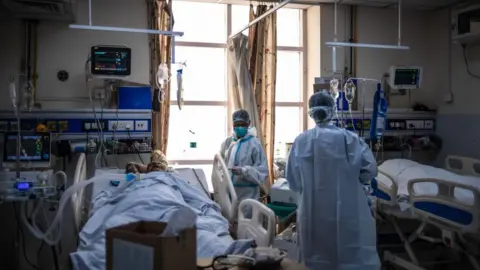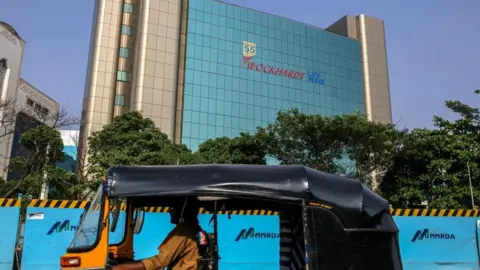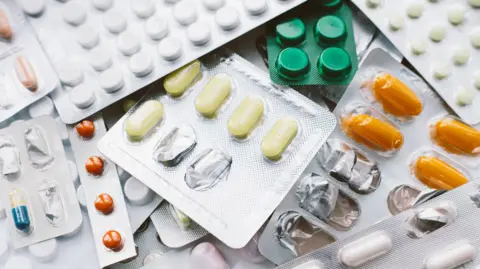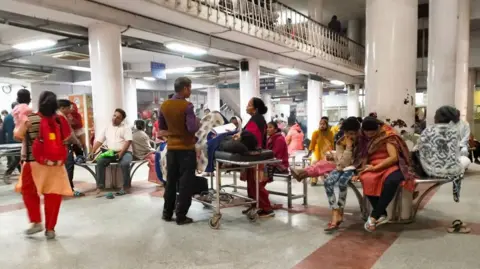India’s ‘blockbuster’ drugs to combat antibiotic-resistant superbugs
 Getty Images
Getty ImagesAntibiotics are hailed as medical saviours.
But they are increasingly facing a crafty adversary: bacteria that mutate and adapt and outwit the very drugs designed to defeat them and cure the infections they cause.
These antibiotic-resistant “superbugs” directly caused 1.14 million deaths worldwide in 2021, according to The Lancet, a medical journal. Antibiotics – which are considered to be the first line of defence against severe infections – did not work on most of these cases.
India is among the countries hardest hit by “antimicrobial resistance”. In 2019 alone, antibiotic-resistant infections caused around 300,000 deaths. They alone are responsible for the deaths of nearly 60,000 newborns each year.
But some hope is on the horizon. A number of promising locally-developed new drugs show potential to combat antibiotic-resistant pathogens. They also offer a game-changing solution to preserve last-resort treatments.
 Getty Images
Getty ImagesEnmetazobactam, developed by Chennai-based Orchid Pharma, is the first antimicrobial invented in India to be approved by the US Food and Drug Administration (FDA). This injectable drug treats severe conditions like urinary tract infections (UTIs), pneumonia and bloodstream infections by targeting bacteria’s defence mechanisms rather than the bacteria itself.
Bacteria often produce enzymes, like beta-lactamase, to destroy antibiotics. Enmetazobactam binds tightly to those enzymes, neutralising them and allowing the antibiotic to kill the bacteria effectively.
To put it simply, the drug immobilises the bacteria’s “weapon” without triggering resistance easily. This also preserves the effectiveness of other antibiotics, including carbapenems, which are the reliable “last line of defence” drugs.
Trials across 19 countries – the drug has been approved by global regulators – with more than 1,000 patients have shown its effectiveness. “The drug has shown remarkable potency against these bacteria that have evolved over the years. It is administered via intravenous [IV] infusion in hospitals, specifically for critically ill patients, and is not available over the counter,” Dr Maneesh Paul, the lead co-inventor of the drug, told the BBC.
Mumbai-based Wockhardt is testing a new antibiotic, called Zaynich, for severe drug-resistant infections. Developed over 25 years, the drug is currently in Phase-3 trials and expected to launch next year.
Dr Habib Khorakiwala, founder chairman of Wockhardt, has described Zaynich as a “ground-breaking, one-of-its-kind new antibiotic designed to combat all major superbugs”. It was administered on compassionate grounds to 30 critically ill patients in India who were unresponsive to any other antibiotics. Remarkably, all survived. “This would make India proud,” Dr Khorakiwala said.
 Getty Images
Getty ImagesAlso in Phase-3 testing is Wockhardt’s Nafithromycin, trademarked as MIQNAF, a three-day oral treatment for community-acquired bacterial pneumonia with a 97% success rate. Existing treatments to the disease have resistance as high as 60%. Its trials are set to conclude next year and once it’s approved, the company says it could be launched commercially by late next year.
A 30-member Bengaluru-based biopharma firm Bugworks Research has partnered with Geneva-based non-profit Global Antibiotic Research and Development Partnership, or GARDP, to develop a new class of antibiotics for treating serious drug-resistant infections. Currently in early Phase-1 trials, the drug is five-to-eight years from market readiness.
“Antibiotics are becoming less effective, but big money is in drugs for cancer, diabetes and other conditions, not antibiotics,” Anand Anandkumar, CEO of Bugworks, told the BBC. “There’s little innovation because antibiotics are kept as a last-resort option. Big pharma isn’t focusing on antibiotic resistance. We’ve been funded by different organisations, but less than 10% of our funding comes from India.”
But that needs to change. A 2023 drug resistance surveillance report by Indian Council of Medical Research (ICMR), which analysed nearly 100,000 bacterial cultures from 21 specialised care hospitals around India, highlighted worrying trends in antibiotic resistance.
E.coli (Escherichia coli), commonly found in the intestines of humans and animals after consumption of contaminated food, was the most frequently isolated pathogen.
This was followed by Klebsiella pneumoniae, which can cause pneumonia and also infect the blood, cuts in the skin and the lining of the brain to cause meningitis. Coming close was the rise of the multidrug-resistant pathogen called Acinetobacter baumannii, which attacks the lungs of patients on life support in critical care units.
The survey found antibiotic effectiveness against E.coli had consistently sharply declined while Klebsiella pneumoniae showed an alarming rise in drug resistance. Doctors found that some of the main antibiotics were less than 15% effective in treating infections caused by these pathogens. Most worrying was the rising resistance to carbapenems, a critical last-resort antibiotic.
 Getty Images
Getty Images“It’s like playing whack-a-mole with bacteria. They evolve at an incredibly fast pace, and we’re always playing catch-up. You get rid of one, another pops up. We need more innovation and to learn from past mistakes,” Dr Manica Balasegaram, executive director of GARDP, told the BBC.
Not surprisingly, GARDP is focussing on India. It’s collaborating with Hyderabad-based Aurigene Pharmaceutical Services to produce zoliflodacin, a novel oral antibiotic for gonorrhea, a sexually transmitted disease which is showing increasing resistance to antibiotics. GARDP has also partnered with Japan’s pharma company Shionogi to distribute cefiderocol – a breakthrough FDA-approved antibiotic for tough infections like UTIs and hospital-acquired pneumonia – in 135 countries, with plans for production in India.
But this is only one part of the story. Doctors say drug prescription practices in India urgently need reform. The widespread use of broad-spectrum antibiotics – they target many bacteria types but can kill good bacteria, cause side-effects and increase antibiotic resistance – fuels drug resistance by encouraging the emergence of drug resistant bacterial mutants.
Instead, say doctors, narrow-spectrum antibiotics should be prioritised. But hospitals often lack antibiograms – microbiology-based antibiotic guidelines – forcing doctors to prescribe “broadly and blindly”.
 AFP
AFP“I am definitely excited that we will have these new drugs. But what is also important is that we should create mechanisms that they should not be misused the way we have previously done with [what were once also] blockbuster drugs. Improper and irresponsible use will compromise the longevity of these new drugs,” warns Dr Kamini Walia, a scientist at ICMR.
The rapid mutation of bacteria, which can evolve in a matter of hours, underscores the urgency of a holistic approach. This includes reducing infections through better water, sanitation and hygiene, improving vaccine uptake, strengthening hospital infection control policies, educating physicians and deterring self-medication by patients. “Combating antimicrobial resistance is a complex, multi-faceted challenge tied to healthcare equity and systemic accountability,” says Dr Walia.
The message is clear: without urgent action, we risk a future where even relatively minor infections could become untreatable.
